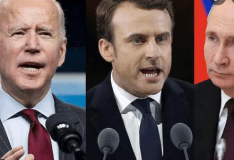A fortnight ago Hitchens wrote that his idol Putin would never invade the Ukraine because he’d be insane to do so. Yet Hitchens had it on good authority that the humanoid bandit in the Kremlin was as sane as they come.

Well, he has invaded. Now I’m eagerly awaiting Hitchens’s mea culpa for his unswerving commitment to regurgitating Kremlin propaganda emanating from a madman. Something tells me I’ll have to wait a long time.
Stephen “I-Agree-With-My-Colleague-Peter-Hitchens” Glover is welcome to join the breast-beating, as are all other fools and knaves who have been shilling for Russia’s KGB regime, kissing Putin’s less attractive parts with ever-increasing gusto.
They’ll never wash the brown stuff off their noses, but an apology would be welcome. Instead I’m sure they’ll continue to blame the West in general and Nato in particular for the latest crime committed by Russia’s evil regime.
And here our paths converge: we arrive at the same point, if by different routes. Unlike Putin’s army of Western fools and knaves, I don’t blame the West for being nasty to Putin. I blame it for being too acquiescent, too negligent, too greedy – and yes, too stupid.
Putin’s strength comes from his ability to blackmail the West with his trillions parked in Western banks, his tanks and planes wholly dependent on Western electronics, and his oft-stated resolve to use nuclear weapons, which is unmatched by our vacillating, venal, vacuous governments.
Last year he reiterated that threat of an all-out nuclear holocaust with a quasi-religious dimension: “We as martyrs will go to heaven, and they’ll croak.” I don’t know how many Russians are willing to accompany Putin to the pearly gates. I hope not too many, although the polls show popular support for this crime.
I also hope that the West will offer a proper response to the nuclear threat Putin issued in the early hours of the morning:
“Whoever tries to get in our way, and especially to create threats to our country and our people, ought to know that Russia’s response will be instant, leading to the kind of consequences they have never encountered in their history. We are ready for every eventuality, and all the relevant decisions have been made. I hope I’ll be heard.”
Loud and clear. The ghoulish yahoo in the Kremlin is ready to attack you, me, our families, our cities, our whole life with nuclear weapons. And it’s we, ladies and gentlemen, who have let it come to this.
For everything that powers Putin’s juggernaut has been imported from the West. There isn’t a single Russian-made computer in Russia, nor a single piece of military equipment without Western components.
Russian hydrocarbon production is wholly dependent on Western technologies and equipment. The money to import all that stuff came from the markets offered by the West and the capital obligingly provided by Western financial institutions.
Driven by the Vespasian principle of pecunia non olet, the West allowed Russian gangsters, including Putin himself, to recirculate their ill-gotten trillions through Western havens. London in particular has been turned into a giant laundromat, with a whole industry rising to serve Putin’s loot: banks, brokerages, consultancies, legal firms, security services, trading houses.
Our governments have been infiltrated from top to bottom by Russian spies and gangsters (the two groups have been fused into one). Our top politicians, including those currently active, form a beeline for directorships in Russian energy monopolies, effectively trading influence for bribes.
And our top newspapers hospitably offer their column inches to blatant and mendacious pro-Putin propagandists, such as Hitchens consistently, the late Christopher Booker in the past, now Glover, occasionally Liddle – and I’m only mentioning some of the British hacks.
France too has its fair share of this breed, one of whose specimens, Zemmour, is trying to become president. And Putin proudly and profitably counts among his friends a former chancellor of Germany, a former president of the US, a former prime minister of France, the current leaders of Hungary and Poland – along with a small army of smaller fry.
At the heart of it all lies the cretinous euphoria (Hitchens described it vividly yesterday) over the transfer of power in Russia from the Party to the KGB, sold to the West as glasnost, perestroika and the collapse of communism. Few Western commentators or politicians saw through that ploy, and those who did chose to shut their eyes and rake in the money.
As a result, the West didn’t demand real changes in Russia as a precondition for any aid or technology transfer. The so-called victory in the Cold War wasn’t at all like the victory in the latest hot war. Russia didn’t disarm and, most important, the most sinister organisation in history, the KGB, didn’t disband. Instead it grabbed all power in Russia, becoming the government, not its servant.
The signs were there from the beginning, and they’ve become bigger and clearer with each year of Putin’s rule, with each crime his bandit regime committed. All such signs have been ignored – even yesterday many commentators, including those within the Russian opposition, sneered at the very possibility of a full-scale Russian invasion.
And now the chickens have come to roost: Europe is facing a major war in its second-largest country (to start with); for the first time since 1962 the danger of a nuclear war is real; the aggressive bandit in the Kremlin has been emboldened and encouraged to press on.
All of this has been entirely predictable, and indeed predicted. But voices crying in the wilderness are only ever heard by the birds and the grass.
I’ve been trying to write in the dispassionate manner prized so highly in British journalism. This has proved impossible. I can no longer whisper, other than praying for the Ukraine and her poor people.
Other than that I have to shout: “Are you happy now, bastards?” And, on a different note, “Long live the Ukraine!”








